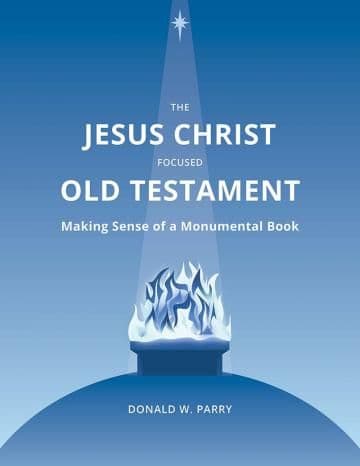Book
56 Chapters

The Old Testament brings to light nine major historical eras. Significantly, the Lord—the premortal Jesus Christ—is the principal, prominent character in all nine eras! Joseph Smith taught, “It has been the design of Jehovah, from the commencement of the world, and is His purpose now, to regulate the affairs of the world in His own time.” Note the following three points:
1. The scriptural texts (Genesis through Malachi) for the nine eras reveal the Lord as God. In other words, the Lord is the God of Adam and Eve, the God of Abraham and Sarah, the God of the judges of Israel, the God of the kings of Judah and Israel and their subjects, the God of the prophets, and so forth. Nevertheless, not all of these individuals or peoples accepted the Lord or worshipped Him.
2. Almost all of the holy scriptural texts in the Old Testament feature the Lord; in fact, the word Lord is attested thousands of times throughout the Old Testament. It is the most prominent content word in the Old Testament.
3. These texts of the nine eras reveal much about the Lord’s divine qualities, character, and nature. The texts also set forth His supremacy, preeminence, and absolute power as He deals with individuals, communities, and nations.
This chart comprises three major parts:
1. The nine eras of the Old Testament, with a descriptive phrase for each era, beginning with the Patriarchal Period and concluding with the Persian Empire. The first four eras—Patriarchal Period, Exodus, Conquest of Canaan, and Judges—are not dated because, as mentioned in the introduction, accurate dating is unavailable.
2. Major characters, including prophets and prophetesses, kings and queens, and famous and infamous persons. Space limitations prevent a listing of all major characters from the Old Testament period, but a comprehensive list of biblical characters can be found in a “Who’s Who” of the Bible (see the “Additional Reading” section).
3. Old Testament books, presenting the biblical books that (a) contain data regarding the historical era, (b) contain data regarding the major characters of that historical era, or (c])were written during that historical era.
Era | Descriptive Phrase | Major Character(s) | Old Testament Book(s) |
1 | Patriarchal Period | Adam, Eve, Enoch, Noah, Melchizedek, Abraham, Sarah, Isaac, Rebekah, Jacob, Leah, Rachel, Joseph, Asenath | Genesis |
2 | Exodus and Wilderness | Moses, Zipporah, Miriam, Aaron | Exodus, Leviticus, Numbers, Deuteronomy |
3 | Conquest of Canaan | Joshua | Joshua |
4 | Judges | Deborah, Jael, Gideon, Samson, Delilah, Naomi, Ruth, Hannah, Samuel | Judges, Ruth, 1 Samuel 1–7 |
5 | United Kingdom (1095–975 BC) | Saul, David, Abigail, Bathsheba, Solomon, Nathan, Gad
| 1 Samuel 8–31, 2 Samuel, 1 Kings 1–11, Psalms, Proverbs, Song of Solomon, Ecclesiastes, 1–2 Chronicles |
6 | Divided Kingdom (930–586 BC) (see also eras 7 and 8) | Rehoboam, Jeroboam I, other kings, Jonah, Amos, Hosea, Gomer, Isaiah, Elijah, Ahab, Jezebel, Elisha | 1 Kings 12–22, 2 Kings, 1–2 Chronicles, Jonah, Amos, Hosea, Isaiah |
7 | Captivity of Northern Kingdom by Assyria; Judah’s History (722–586 BC) | Various kings, Isaiah, Micah, Zephaniah, Nahum, Habakkuk, Josiah, Huldah, Jeremiah | 1–2 Chronicles, Isaiah, Micah, Zephaniah, Nahum, Habakkuk, Jeremiah |
8 | Captivity of Jerusalem and Judah by Babylonia (586–538 BC) | Ezekiel, Daniel | 1–2 Chronicles, Lamentations, Ezekiel, Daniel |
9 | Persian Empire (Cyrus to Alexander) (538–333 BC) | Cyrus, Zerubbabel, Haggai, Zechariah, Obadiah, Malachi, Esther, Ezra, Nehemiah | Haggai, Zechariah, Obadiah, Malachi, Esther, Ezra, Nehemiah |
Book
56 Chapters

Items in the BMC Archive are made publicly available for non-commercial, private use. Inclusion within the BMC Archive does not imply endorsement. Items do not represent the official views of The Church of Jesus Christ of Latter-day Saints or of Book of Mormon Central.